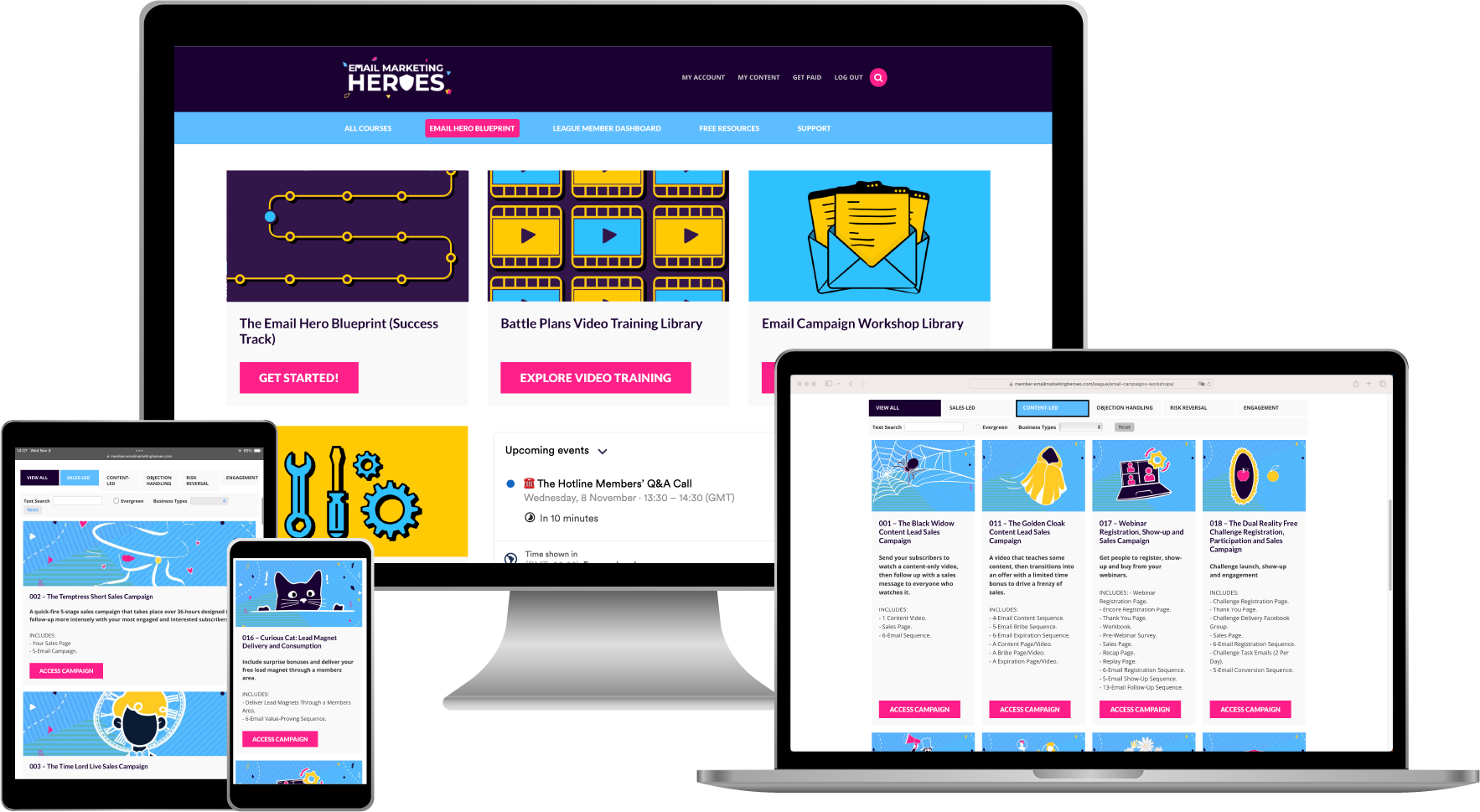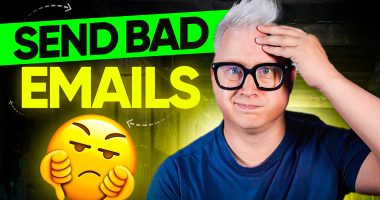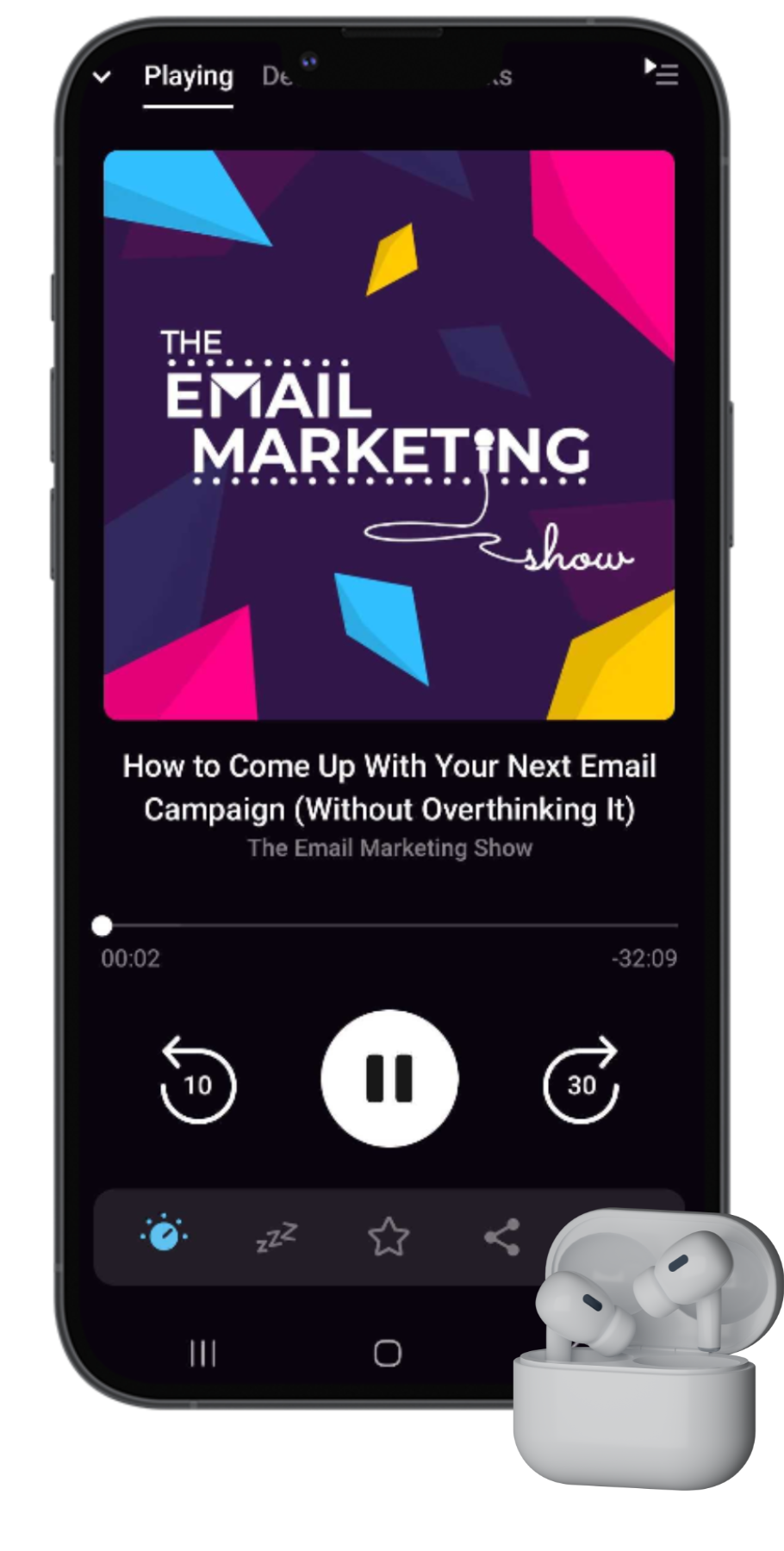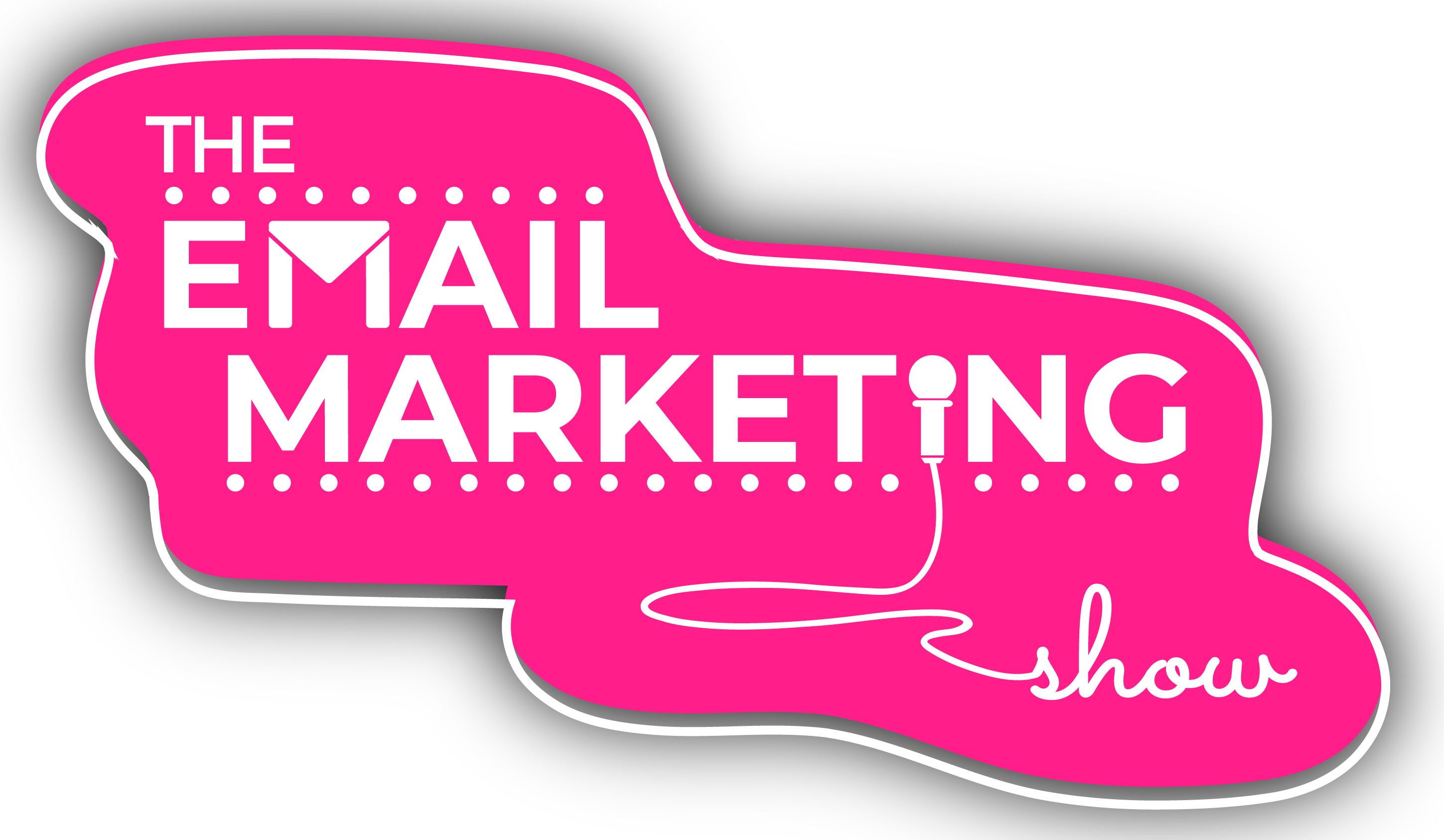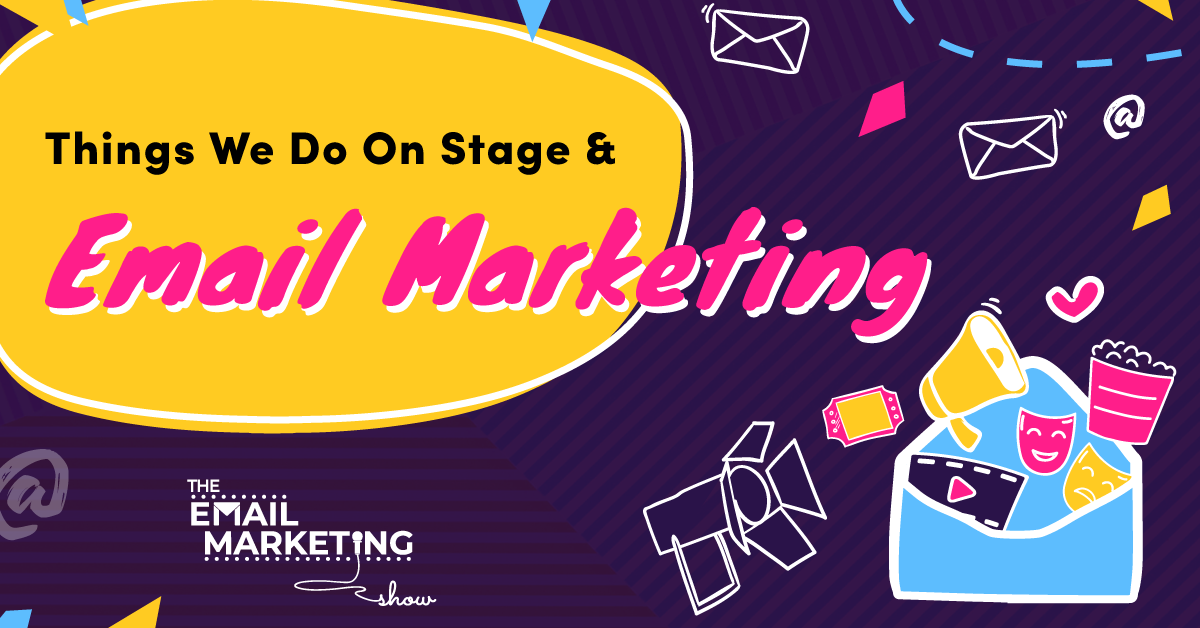
12 Things That We Use On Stage That Help Our Email Marketing
What do stage entertainment and email marketing have in common? As you may know, we are both from an entertainment background. Rob is a comedy hypnotist and Kennedy is a psychological mind reader (or mentalist). That means we spend a big chunk of our lives on stages using psychology to make people do certain things, to perform and entertain an audience, and make it funny, interesting, and engaging in the process. So today we're sharing 12 email marketing strategy examples from our on-stage careers that we use in our psychology-driven email marketing.
Ready to find out how you can apply these ‘tricks' to your email marketing?
SOME EPISODE HIGHLIGHTS: (00:09) Want to make your sales from your email marketing? Grab our Click Tricks. (4:28) Train your audience and create authority. (9:54) Grab and keep people's attention. (12:27) Be yourself and surprise your audience. (16:49) Tell stories and create a setup & payoff situation. (21:03) Build beliefs. (21:38) Adjust and adapt the way you address people. (24:51) Find the most efficient way to do things. (27:08) Pay attention to language patterns. (28:58) Subject line of the week.
Want to get more sales from your email marketing?
We put a little something together for you. It's really cool and it's FREE (yes, it's cool and free – we're nice like that). If you want to make more sales from your email marketing, you need more clicks on the things that you're selling!
That's why we're giving you 12 creative ways to help you get more clicks in every email you send. It's a FREE download, and it's called Click Tricks. You can grab it here.
1. Train your audience
The first strategy we'd like to share is training your audience. What do we mean by this? Well, this may sound strange, but when people go to an event for the first time, they don’t know how to behave. Can they interact with the host? Should they stand up or sit down? People have questions. So the first thing we do when we get on stage is to explain the culture and the rules of engagement. In other words, we train our audience.
We do this right at the start of our opening bid, which is highly interactive and more akin to stand-up comedy. It’s where we let people know how the show is going to go. We communicate our style and form of entertainment, which is individual to each performer.
And we do the same in our email marketing, which is why we talk about how important it is to tell your audience how often you're going to email them and what they can expect from you, for example. Tell them if they can reply – and of course, we encourage that.
In our Getting to Know You sequence (i.e. our welcome sequence) we ask a question that gets people to reply. And we also include a link (or several) in every email we send. Because this teaches our audience that every time they click on a link in one of our emails, they get rewarded with something valuable.
Whatever you do (or don’t do) in your email trains your audience into specific behaviours – whether you're doing this consciously or not. Are these behaviours serving you (and your audience) in a positive way? Because if they're not, you may be stopping people from getting value from what you do. So become aware of what you’re training your audience to do.
2. Create authority
Another important email marketing strategy example we want to share is creating authority. As entertainers, sometimes we go on stage to perform in front of a group of people who don’t know who we are or whether we’re any good. People have to believe that we can deliver the show that’s been promised – that we can do what we said and that it's going to work.
And in order to achieve that, we need to create authority. Of course, there's some natural authority that comes with the framing of the show. People spent money to buy a ticket and come to the show so they already assume (to a degree) that it’s going to work.
Now if you translate that into the email marketing world, the fact that someone set up a business with a website where you can subscribe to their email list already creates some sense of authority. But above and beyond that, you want to show people what you’ve done before and what you could do for them.
On stage, we do this with footage and clips from previous shows that prove that we can do what we say we do. But remember it’s important to create authority by giving proof or evidence that working with you is going to be worth their time.
3. Grab people's attention
The next thing you want to do is ensure you have the attention of your audience. This is true on stage but also in your email marketing. If you don't have people's attention at the beginning of the show or at the start of your relationship with your subscribers, they’re going to talk all the way through (at a show) or not pay attention. And you don't want that – you want their attention.
So how do you do it? First of all, you show up with something that’s attention-grabbing. In the world of email marketing, this is done by giving people a promise when they first opt-in and making sure you deliver on that promise. And the first thing you have to always deliver on is your name – it needs to be the same whose list people subscribed to. We see that mistake a lot with business owners using a different name in their emails compared to what they have on their website.
4. Generate engagement and keep people's attention
Another one of our email marketing strategy examples we want to share is to grab and keep attention through subject lines, for example. They set an expectation, they grab someone's attention right from the start, and they help you keep it. When it comes to our shows, for example, we keep people’s attention by making sure our events are fast-paced and interesting. If we used a boring, corporate voice with no personality, people’s attention would immediately drop.
So keep it pacey, get to the point, stop waffling, and don’t give people too many things to think about at once. That’s why we suggest you don’t put too many points or offers in one email – one email is one offer, just like on stage you give one instruction at the time. Otherwise, it gets confusing and people can’t keep up or remember, so they don’t do anything. It's about being clear in your instructions to keep people engaged.
5. Be yourself
This is a contentious subject in the world of entertainment these days, but you're the one on stage, and it's your show. So within the confines of what’s acceptable, tell the jokes you want to tell. And if people don’t like them, that’s fine. They don’t have to buy tickets and come and watch you. It's okay to polarise people. In fact, if you're not making an attempt to make your stuff disliked by some people, you probably don’t have a tight enough angle – and you definitely want one.
Even within the culture of cancelled entertainment, we still want to be ourselves and do a show that’s enjoyable for us. We want to be able to tell the jokes that we want to tell and write the emails that we want to send. Because if you compromise on that, you’ll end up with a show (or a business) that you don’t actually like! We say this all the time – we’d rather not have our business, podcast, or membership The League if it meant we’d have to be boring and corporate. If we couldn't be ourselves and had to behave differently, we wouldn’t want to do it. This is who we are, and we love to create content that we would like to consume, which is what we suggest you do too.
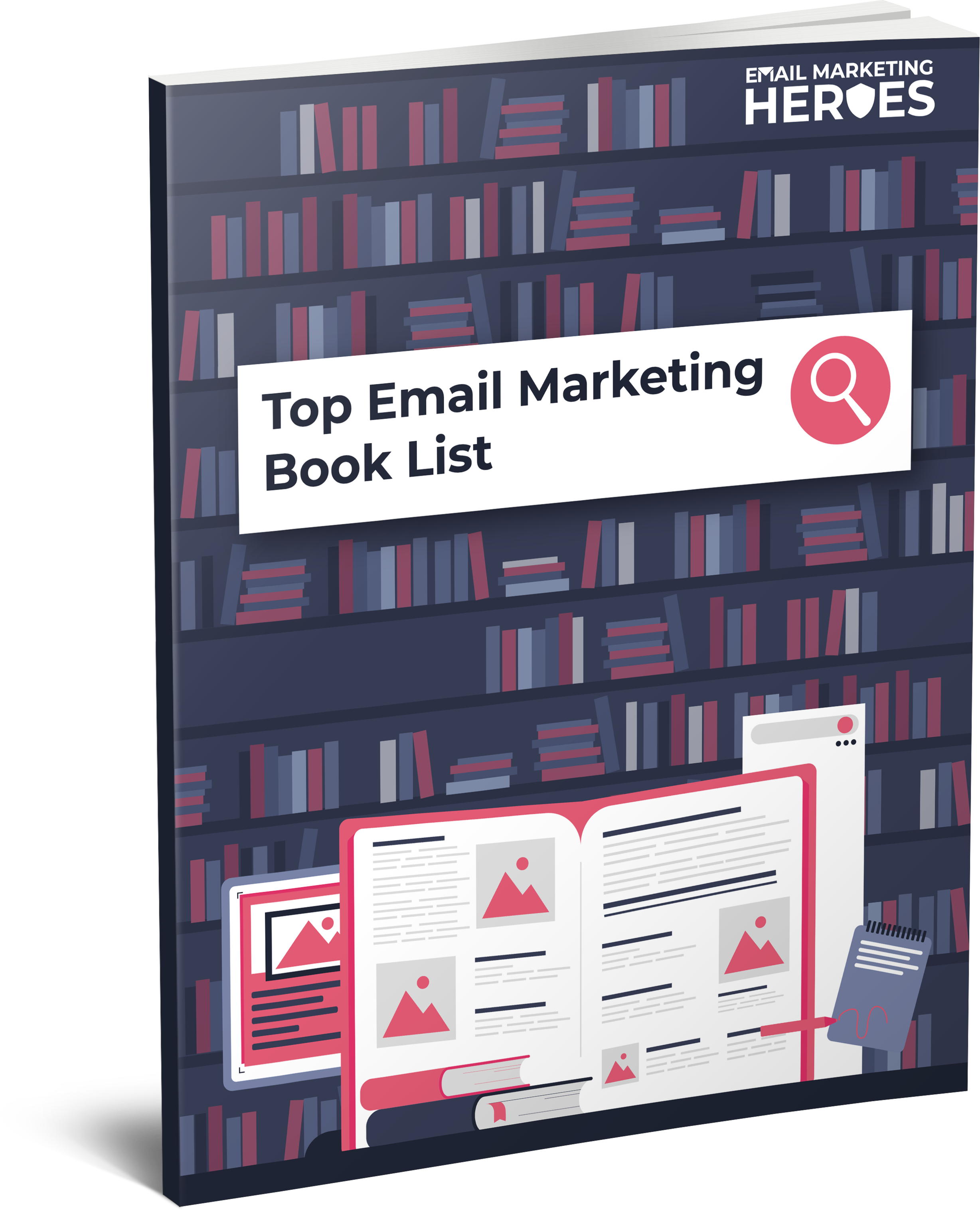
The Top 10 Books To 'Power Up' Your Email Marketing
10 book recommendations that will improve all areas of your email marketing (including some underground treasures that we stumbled upon which have been game-changing for us).
6. Surprise your audience
If you’re always doing the same thing and what you say, do, or write, is very formulaic, then you won’t keep people engaged. And also, you won’t be able to create an emotional response.
For example, during his show, Kennedy might ask someone to take out their phone, find a photo, and look at it. And then Kennedy will start describing that photo. By the end of that segment, people will be amazed, but the reality is that the audience can tell where that is going. They know what he's going to do when he first asks someone to pick a photo. There’s no element of surprise there because the ending is implied in the setup. But if at the end of the show Kennedy tells that person what photo they almost picked, then there’s a surprise!
And surprises are great at energising people. They set off different neurotransmitters in your brain that get you re-engaged or hyper-engaged. So think about sending pieces of content that are surprising and not what people expect. That’s why we often use elements of surprise and funny quirky analogies when writing our emails. How can you surprise your audience? Could you offer something for free, for example?
7. Tell stories
Another one of our email marketing strategy examples taken from our shows is to tell stories. Rob, for example, will paint a picture and create a story to give people suggestions about what he's asking them to do. He talks them through the narrative of a story so they can paint that picture in their brain. And he does it that way because stories allow people to make connections that are emotional, real, and interesting.
For example, you could build stories around how your product or service was created, how it can be used, or how it should never be used (that would be interesting!). Or maybe you could create a story around why your business is more credible than others.
As entertainers, we use stories to get people to emotionally buy into what we’re about to demonstrate on stage. So if you want to do the same, show them something or let them see something in your business.
8. Create a setup & payoff situation
Another strategy we use in our entertainment careers is to set something up and then make sure there’s always a payoff. So if Kennedy tells his audience to think of a card from a deck, for example, at some point he has to tell the person what card they picked. If he forgets or can’t figure out what the card is, there’s no payoff to that segment. And people need the payoff! If a magician makes something disappear, they also have to make it re-appear. Otherwise, it’s an incomplete loop in people’s minds!
In the world of email marketing, that means that if you say something, you have to deliver on that. If you tell people you have a free workshop, it has to happen. And it has to be free! If not, people don't get their payoff. And when people don't get that, they stop buying into the setup. You need that buy-in because it's what gets people excited. So make your payoff clear and then make sure it always happens – without exceptions.
9. Build beliefs
We talked about this before, but building beliefs is essential – both on stage and with your email marketing. This is definitely one of the email marketing strategy examples we stand by because, on stage, people need to believe that we can do what we said we’d do and that it’s going to be enjoyable. We do that by demonstrating, proving, and showing people what things we’ve done in the past. But we also build beliefs by sharing stories and dropping hints. So make sure you do the same in your email marketing.
10. Adapt and adjust the way you treat people
During our shows, we ‘read' people – we have to figure them out. And then we adjust our behaviours accordingly. That means we treat people in different ways depending on how they act.
For example, Rob will need to always adjust the language pattern he uses to hypnotise someone based on signals he reads from a person. So he'll observe how they sit, how they engage with him, where they're looking, etc. And Kennedy will ask someone from the audience coming up on stage all sorts of questions. Why? To see how they behave on stage. Then based on their reactions, he'll use different techniques to either figure out or influence what they're thinking.
How does this relate to your email marketing? In your email marketing, you should collect lots of data points about your subscribers, including how they came into your world. Because that gives you information about them and what they're interested in. Pay attention to what they engage with or what they click on. Trust what people do – not what people say. And then adjust your behaviours accordingly.
If you have a subscriber who always watches videos, for example, send them an offer via video. Or if they always engage with a certain topic, send them more content that seems important to them. Read people, figure out data points, and then adjust your behaviours based on theirs.
11. Find the most efficient ways to do things
Another one of our email marketing strategy examples is to find the most efficient ways to do things. So if Rob is hypnotising someone, the process needs to be interesting and engaging. Otherwise, his audience is going to switch off and stop paying attention. The same happens with Kennedy in his shows. If he’s not using the most efficient route to get to an answer and is taking too long, then people are going to get bored.
So we’re always looking for interesting shortcuts and tricks to speed up our processes and for efficient ways to get in front of an existing audience to get extra attention.
12. Pay attention to language patterns
And finally, the last of our email marketing strategy examples from our on-stage career is to pay attention to language patterns. Why is this important? Because it helps you influence people. We have a full programme called Remote Control Persuasion, which is all about that. But the idea is that whenever you're communicating (whether it's through typing or speaking the words), it’s about knowing that some words are going to be more impactful and influence others while other words will do the opposite.
So start looking at your language. Are you helping people with what you’re saying? Are you moving your audience towards where you want them? Or are you saying negative things that make them go round in circles? Everything you do and say in your emails (including the language you use) has an influence. Because we emotionally buy into the words that people use. So you want to make sure you’re using language that nudges people in the right direction. And changing little words every now and then makes a difference.
Did you enjoy the 12 email marketing strategy examples we shared with you today?
Subject line of the week
This week’s subject line is “was $499 (now FREE)”. This is something you can use if you have a discount or if you're introducing a before and after price or offer. Or you could say something along the lines of “today it’s $29. Tomorrow, it's $499”. This tells the whole story in the subject line, but people still need to open the email and click on the links to grab the offer.
So it's something you can use on the last day when an offer is about to close, for example. This subject line was from the opening email of one of our campaigns, but we also used it as the closing one. It works well for demonstrating and telling the whole story in a short subject line and encouraging people to act now.
Useful Episode Resources
Related episodes
Making Yourself Choosable with Belinda Weaver.
The Little-Known Right Order to Make Your Offers (For Maximum Sales).
9 Psychological Things That We Use In All Of Our Campaigns.
FREE list of the top 10 books to improve your email marketing
If you want to write better emails, come up with better content, and move your readers to click and buy, here's how. We put together this list of our Top 10 most highly recommended books that will improve all areas of your email marketing (including some underground treasures that we happened upon, which have been game-changing for us). Grab your FREE list here.
Join our FREE Facebook group
If you want to chat about how you can maximise the value of your email list and make more money from every subscriber, we can help! We know your business is different, so come and hang out in our FREE Facebook group, the Email Marketing Show Community for Course Creators and Coaches. We share a lot of training and resources, and you can talk about what you're up to.
Try ResponseSuite for $1
This week's episode is sponsored by ResponseSuite.com, the survey quiz and application form tool that we created specifically for small businesses like you to integrate with your marketing systems to segment your subscribers and make more sales. Try it out for 14 days for just $1.
Join The League Membership
Not sick of us yet? Every day we hang out in our amazing community of Email Marketing Heroes. We share all of our training and campaigns and a whole bunch of other stuff. If you're looking to learn how to use psychology-driven marketing to level up your email campaigns, come and check out The League Membership. It's the number one place to hang out and grow your email marketing. Best news yet? You can apply everything we talk about in this show.
Subscribe and review The Email Marketing Show podcast
Thanks so much for tuning into the podcast! If you enjoyed this episode (all about the 12 email marketing strategy examples that we use on stage) and love the show, we'd really appreciate you subscribing and leaving us a review of the show on your favourite podcast player.
Not only does it let us know you're out there listening, but your feedback helps us to keep creating the most useful episodes so more awesome people like you can discover the podcast.
And please do tell us! If you don't spend time on email marketing, what do you really fill your working days with? We'd love to know!

